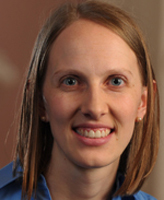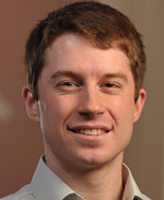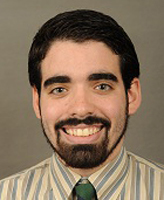Three psychology students from Notre Dame’s College of Arts and Letters and six students from the University’s College of Science were awarded 2013 fellowships through the Graduate Research Fellowship Program from the National Science Foundation (NSF). This is a record success for the University, with this year’s nine winners equaling the total number of fellowships Notre Dame students received in the previous seven years combined.
The NSF recognized Caroline Byrd for her developmental psychology work on mathematical knowledge in children, Enmanuelle Pardilla-Delgado whose cognitive psychology work examines the influences of sleep on memory, and Patrick Miller who focuses on innovative statistical methods for understanding the role of genetics in psychological disorders. Miller was the recipient of the only NSF fellowship awarded to a quantitative doctoral student in the entire country.
“The National Science Foundation Graduate Research Fellowships are given to the nation’s most promising young researchers. They are extremely competitive and prestigious,” says Associate Professor James Brockmole, acting associate dean for undergraduate studies and former director of graduate studies in the Department of Psychology.
“In psychology, we are thrilled to have three students recognized for their outstanding research projects this year. Our fellows’ work will be transformative in terms of both their individual development and national conversations taking place surrounding education, health, and genetics.”
In 2012, Allison Gaffey, a Ph.D. student in the clinical psychology program, was awarded an NSF fellowship for her research on stress physiology. She was the first in the Department of Psychology to earn this distinction.
The fellowship program recognizes and supports outstanding graduate students in NSF-supported science, technology, engineering, and mathematics disciplines who are pursuing research-based degrees. The award provides an annual stipend, tuition allowance, and opportunities for international research and professional development for three years. Past fellows include numerous Nobel Prize winners, U.S. Secretary of Energy Steven Chu, Google founder Sergey Brin, and Freakonomics co-author Steven Levitt.
“The sharp increase in the number of fellowships received by students in the Department of Psychology and across the University is a testament to the excellence of our students, our graduate programs, and our faculty,” Brockmole says.
Caroline Byrd

Developmental Psychology
Adviser: Nicole McNeil, ACE Associate Professor of Psychology
Project: “Are the beneficial effects of gesture on learning due to eye movements?”
Research has shown that asking children to mimic specific gestures prior to instruction on math equivalence problems helps them generate and maintain correct problem-solving strategies. These findings support the idea that gesturing facilitates learning; however, the gestures children have mimicked in previous studies have all been relational gestures that move children’s attention back and forth across the equal sign. In my project, I will test the hypothesis that the benefits of these gestures are not due to gesture per se, but rather, are due to the eye movements that accompany the gestures. Research conducted with adults indicates that looking back and forth across the equal sign is correlated with correct strategies to solve math equivalence problems. Research also shows that participants’ eye movements predict correct problem solving and that directing eye movements in a pattern that embodies a correct solution leads to successful problem solving. If gesture facilitates learning by eliciting certain eye movements, then this would advance theory and provide educators with a guiding principle for designing learning materials.
Career Goals: My career goal is to be immersed in research at either a major research institution or an educational research organization. Ultimately, my long-term goal is to conduct research that contributes to improvements in instructional methods that advance children’s mathematical understanding.
Patrick Miller

Quantitative Psychology
Adviser: Gitta Lubke, Associate Professor of Psychology
Project: “Searching through multiple haystacks: A statistical learning method for finding important predictors in high dimensional data with multivariate outcomes.”
Brief Description: In my lab, we are generally interested in understanding the impact of genetics on psychological disorders. One approach that we use is to find sites of genetic variation (nucleotide polymorphisms) that are associated with these disorders. The effect of each polymorphism is very small, so I propose to develop and evaluate a new statistical method that might give us more power to detect these effects. One additional benefit of the research is that the method could be used more generally for variable selection with multivariate outcomes, where the number of potential predictors far exceeds the sample size.
Career Goals: My goal is to develop and use novel statistical methods to help address substantive questions in psychology or other social sciences.
Enma Pardilla-Delgado

Cognition, Brain, and Behavior Psychology
Adviser: Jessica Payne, Nancy O’Neill Collegiate Chair in Psychology
Project: “How sleep influence the memory for gist over the long term?”
Brief Description: My project investigates how sleeping (and sleep architecture) right after learning affects two different types of memory over the course of 24 and 48 hours. More importantly, I want to know how sleep and the physiological correlates of sleep affect our memory for the gist (or main theme) of events. It has been shown that gist memories persist over time while memories for specific details decay. My research investigates whether this “gist persistence” is dependent or related to sleep right after learning.
Career Goals: I plan to eventually become a full-time professor mainly focused on research and ideally I would study sleep and memory in Puerto Rico, where no one is currently doing research in this field. I am also very interested in the scientific study of dreaming and its relationship to memory.
Graduate Support
Students applying for NSF awards create a research plan for the fellowship program in conjunction with their adviser. The rise in awards won by Notre Dame students corresponds to an increased effort from the Graduate School to provide both one-on-one consultations and group support for students throughout the external funding process. This assistance includes finding opportunities, writing and revising proposals, and submitting formal applications.
As part of the effort, Gretchen Busl, associate program director for grants and fellowships, has conducted a summer support program, a fall workshop series, and an intensive fellowship “boot camp” each fall and spring break.
In addition to the three winners from Notre Dame’s Department of Psychology, the following six graduate students from the College of Science were honored:
- Jennifer Arceo, Chemistry & Biochemistry (Analytical Chemistry);
- Eric DeLeon, Biological Sciences (Physiology);
- Rachel Schluttenhofer, Biological Sciences (Microbiology);
- Shayna Sura, Biological Sciences (Ecology);
- Victoria Tomiczek, Engineering (Civil Engineering); and
- Carmella Vizza, Biological Sciences (Ecology)
Learn More >
- Department of Psychology
- The Graduate School
- National Science Foundation
- Research profiles of all the NSF GRFP winners
- Related story: Psychologist Nicole McNeil Receives APA Award
- Related story: Psychology Professor Seeks Clues to Psychiatric Disorders in DNA
- Related story: Jessica Payne’s Research Shows Benefit of Sleeping After Processing New Info


